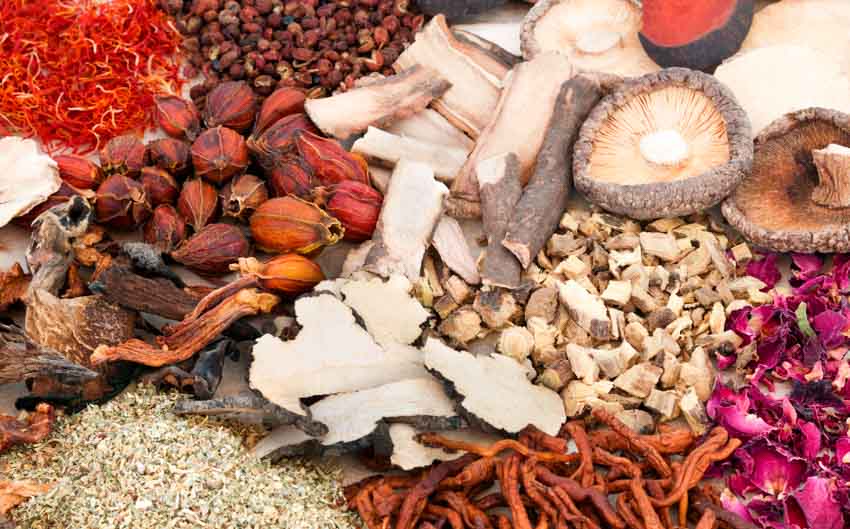
Chinese herbal medicine reduces COVID-19 mortality rates, finds a retrospective study conducted at Wuhan No. 1 Hospital. The hospital is one of the largest centers specifically designated to treat patients with severe coronavirus disease 2019 (COVID-19) using integrated traditional Chinese medicine (TCM) and biomedicine.
Since its outbreak in December 2019, China has supported an integrated approach to treating COVID-19 due to its high mortality rate, combined with the lack of an effective vaccine or antiviral treatment. Chinese herbal medicine (CHM) is promoted due to its “multi-component and multitarget” characteristics. The results of this study support the use of CHM in combination with biomedical treatment, finding that it significantly reduces the risk of death due to COVID-19.
Participants
A total of 662 patients were initially included in the study, 484 of which received CHM and 178 of which acted as non-CHM controls. However, there were significant differences between the two groups in terms of age, medical history, signs and symptoms, laboratory results, and treatment. Therefore, the researchers used propensity score matching (PSM) to match each patient that received CHM to a similar patient that did not, using a nearest neighbor matching algorithm.
After PSM, each group was comprised of 156 patients. The CHM group included 68 male and 88 female patients with a mean age of 63 years. There were 118 severe cases and 38 critical cases, as determined by the fifth edition of the Diagnostic and Treatment Guideline for COVID-19 (Trial Version). The control group was comprised of 74 male and 82 female patients, with a mean age of 63 years. Identical to the other group, there were also 118 severe and 38 critical cases. Although PSM balanced the two groups in terms of age, sex, and disease severity, there remained unavoidable differences in medical histories, antibiotic use, and hormone treatments at baseline.
Procedures
All patients received oxygen therapy, antiviral treatment (interferon or ribavirin), and antibiotics (moxifloxacin, cefoperazone sodium, or sulbactam sodium). Critical patients were also treated with non-invasive and invasive mechanical ventilation and extracorporeal membrane oxygenation (a process that involves pumping blood through a heart-lung machine to facilitate gas exchange while bypassing the heart and lungs to allow healing). CHM treatment was based on the Ma Huang Liu Jun Tang formula and consisted of the following herbs:
- Fu Ling
- Huang Qi
- Huo Xiang
- Ku Xing Ren
- Bai Zhu
- Ban Xia
- Gan Cao
- Hou Po
- Ma Huang
- Gui Zhi
- Huang Qin
- Sha Ren
- Jie Geng
- Pei Lan
- Dang Shen
Patients in the CHM group took 200 ml of the decoction, twice daily, for the duration of their hospital stay.
Outcomes
Outcome measures for the study were discharge from the hospital or all-cause mortality (including respiratory failure, septic shock, gastrointestinal bleeding, heart failure, stroke, multiple organ dysfunction syndrome (MODS), and surgery). The criteria for discharge included absence of fever for ≥72 hours, significant improvements in both lungs as shown by chest computed tomography, remission of respiratory symptoms, and two negative throat-swab tests for SARS-CoV-2 RNA (at least 24 hours apart).
Of the 662 patients assessed prior to PSM, at total of 71 (10.7%) died and 591 (89.3%) were discharged. Patients receiving Chinese herbal medicine had a mortality rate of 3.1% (15 deaths) and biomedicine monotherapy produced a 31.5% (56 deaths) mortality rate. [1] The causes of mortality were as follows:
- Acute respiratory failure: 49 cases (69%)
- Septic shock: 5 cases (7%)
- Respiratory failure with septic shock: 4 cases (5.6%)
- MODS: 3 cases (4.2%)
- Acute myocardial infarction: 2 cases (2.8%)
- Death following surgery: 2 cases (2.8%)
- Respiratory failure with tumors: 2 cases (2.8%)
- Respiratory failure with heart failure: 1 case (1.4%)
- Respiratory failure with myocardial infarction: 1 case (1.4%)
- Gastrointestinal bleeding: 1 case (1.4%)
- Stroke: 1 case (1.4%)
The mortality figures include a total of 15 (3.1%) for CHM users and 56 (31.5%) for non-users. After PSM, the all-cause mortality rates were calculated at 8.3% in the CHM group and 23.1% in the non-CHM group, indicating that CHM significantly reduces the risk of death. Another critical factor was age, with the risk of death increasing by 5% with each additional year of age.
Discussion
The current research indicates that CHM improves outcomes and reduces mortality rates in patients with severe or critical COVID-19 infections. Treatment principles include opening the lungs and relieving cough, resolving dampness and detoxifying, tonifying qi, and strengthening the middle burner (jiao). The focus is on promoting healthy qi and expelling pathogenic factors, while regulating the internal environment, enhancing immune function, increasing antiviral activity, reducing inflammation, improving symptom relief, preventing organ failure, and reducing mortality.
This is achieved by selecting herbs such as Ma Huang, Ku Xing Ren, Pei Lan, and Huang Qi, which have been shown to relieve bronchial edema, relax smooth muscle, eliminate phlegm, reduce coughing and dyspnea, and protect the bronchial mucosa. Furthermore, Huo Xiang and Ma Huang possess both antiviral and anti-inflammatory properties. Meanwhile, Huang Qi, Dang Shen, Bai Zhu, and Fu Ling enhance immunity and ameliorate organ failure due to hypoxia and ischemia.
The authors of the Wuhan Hospital study conclude, “This retrospective cohort study is the first to reveal that the use of CHM in patients with severe/critical COVID-19 can reduce mortality. Thus, TCM may also be an option in the treatment of patients with severe or critical COVID-19 in addition to antiviral and supportive therapies.” Based on the data, further research involving a larger cohort or employing a randomized-controlled methodology is warranted.
Reference:
1. Chen, Guohua, Wen Su, Jiayao Yang, Dan Luo, Ping Xia, Wen Jia, Xiuyang Li et al. "Chinese herbal medicine reduces mortality in patients with severe and critical Coronavirus disease 2019: a retrospective cohort study." Frontiers of medicine (2020): 1-8.


